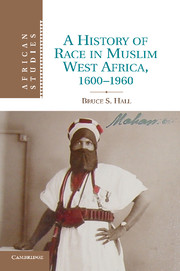Book contents
- Frontmatter
- Contents
- List of maps and figures
- Acknowledgments
- Note on orthography
- Abbreviations used in references
- Glossary
- Introduction
- PART ONE Race Along The Desert Edge, C. 1600–1900
- PART TWO Race And The Colonial Encounter, C. 1830–1936
- PART THREE The Morality of Descent, C. 1893–1940
- 5 Defending Hierarchy
- 6 Defending Slavery
- 7 Defending the River
- PART FOUR Race and Decolonization, C. 1940–1960
- Conclusion
- Index
- Misc-endmatter
- References
5 - Defending Hierarchy
Tuareg Arguments about Authority and Descent, C. 1893–1940
Published online by Cambridge University Press: 05 August 2011
- Frontmatter
- Contents
- List of maps and figures
- Acknowledgments
- Note on orthography
- Abbreviations used in references
- Glossary
- Introduction
- PART ONE Race Along The Desert Edge, C. 1600–1900
- PART TWO Race And The Colonial Encounter, C. 1830–1936
- PART THREE The Morality of Descent, C. 1893–1940
- 5 Defending Hierarchy
- 6 Defending Slavery
- 7 Defending the River
- PART FOUR Race and Decolonization, C. 1940–1960
- Conclusion
- Index
- Misc-endmatter
- References
Summary
A RACE APART?
French officials in the Niger Bend understood the nobles in Tuareg and Arab society to be outsiders who were racially distinct from the “indigenous” black peoples of the Niger Bend. From the beginning of the colonial occupation, French writers sought racial explanations for social distinctions between nobles, vassals, and slaves. In the French productions of thumbnail histories and sociologies of the pastoralist peoples of the Niger Bend, the “nobles” were almost always described as “white,” even when referring to groups such as the Kunta, who were otherwise considered to be quite dark-skinned because of their purported intermixing with their slaves. We find the Arabs, or “Moors,” described as “a more or less pure race.” Furthermore, “the Moors have the feature of Mediterranean peoples: straight nose, thin lips, soft hair.” In the context of the Niger Bend, such racial description stood in (often unstated) contrast to the population defined as black.
Tuareg nobles were described in nearly the same way. It was argued that they had retained the purity of their blood, at least with respect to black, if not always Arab, admixtures. In 1923, a colonial study reported that among the Tuareg, “mulattos do not exist because the men do not recognize their bastards and the women pour such scorn on their slaves for having relations with them.” The Tuareg possess “Mediterranean features with a fine nose, thin lips, leather color, and soft hair.
- Type
- Chapter
- Information
- A History of Race in Muslim West Africa, 1600–1960 , pp. 176 - 208Publisher: Cambridge University PressPrint publication year: 2011



